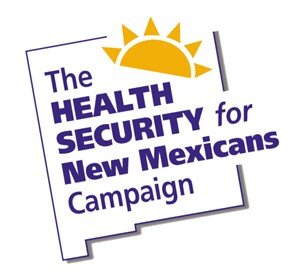More than five years after the Affordable Care Act was passed, it is clear that the current private insurance system is still not working. New approaches are needed -- something that is allowed under the Affordable Care Act's Waiver for State Innovation provision.
The Health Security Act presents a viable, vetted alternative to a system dominated by the insurance and pharmaceutical profit interests. (For more information about how the Health Security Plan would fit into the Affordable Care Act, click here.)
This election year is an especially critical time for supporters to educate friends, family, co-workers, and candidates for public office about the need to support this uniquely New Mexican solution.
Disturbing Statistics
1. New Mexico exchange enrollment not meeting expectations
The health insurance exchange set up in New Mexico under the Affordable Care Act is not growing sustainably. Only about 55,000 people are enrolled in the exchange. This is a small percentage of the total private insurance market, which raises the question of whether the exchange can generate sufficient premium revenues to pay for its administrative overhead. New Mexico's low enrollment numbers are not unique. Other states are confronted with similar challenges.
The problem: As a recent Legislative Finance Committee report states, "If enrollment remains low, the [New Mexico exchange] might not be cost effective as a stand-alone entity." (Report #15-11 [Oct. 28, 2015], p. 22)
2. Medicaid enrollment going through the roof
One positive note is the number of New Mexicans enrolled in Medicaid, which has grown dramatically under the (mostly) federally funded Medicaid expansion. Almost 40% of New Mexico residents are now covered by this program.
The problem: This increase, however, is further straining the state's financial situation and is resulting in proposed cuts to reimbursement rates for Medicaid providers, which will make it more difficult for Medicaid recipients to find doctors who will treat them.
3. New Mexico health insurance profits falling
In 2015, New Mexico Health Connections lost $23 million, and Molina Healthcare lost $1.6 million. While Presbyterian Health Plan made $29.8 million, that was far below the $71 million the company made in 2014. (ABQ Free Press, Mar. 25, 2016)
The problem: Decreasing profits will likely result in increases in premiums, deductibles, and copays. According to a recent Albuquerque Journal article, we can expect more requests for premium increases in the coming year.
UPDATE: Requested premium increases for 2017 range from 3% to 83% (Albuquerque Journal, May 18, 2016).
4. Pharmaceutical prices still rising
The price of pharmaceutical drugs continues to climb.The New York Times reported in late April that pharmaceutical companies have "raised prices on brand-name drugs by double-digit percentages since the start of the year."
The problem: These unwarranted price increases show no signs of slowing down, despite national attention by the media and, in the case of drug makers Valeant and Turing, congressional hearings.
5. Greater limitations on physician choice
As a way to control prices, insurance companies are tightening provider networks while dropping PPO plans (which allow patients to choose providers outside the plan's network). Why? According to Lisa Reid at the NM Office of the Superintendent of Insurance, "It's probably because insurers have less control over costs with PPO plans because they (customers) can pick the doctors they want." (Albuquerque Journal, Sept. 15, 2015)
The problem: Not only is provider choice being limited, but a patient at an in-network hospital can be billed for services performed by providers (for example, an anesthesiologist) who are not included in their plan's network.
The Bottom Line
New, affordable approaches to providing health care access and coverage are clearly needed -- and, as stated above, state-based models (like Health Security) are allowed under the Affordable Care Act's Waiver for State Innovation provision.
Now more than ever, we need to spread the word about the Health Security approach.
Take Action!
It's an election year, and one thing you can do is talk about Health Security at upcoming candidate forums and in meetings with candidates. Find out where the candidates stand on health care reform, and encourage them to support the Health Security Act, which lets New Mexicans -- not the insurance and pharmaceutical industries -- take control of health care access and costs.
